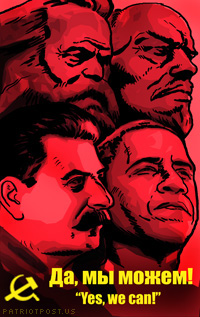|
greytrek.com |
|
|
Seeking Veracity |
|
The Community Organizer
 Saul Alinsky was the
quintessential "Community Organizer" of the
1930s. He died in 1972 but his ideas seem to live on in the minds
of President Obama and his progressive Administration through Alinsky's
1971 book, "Rules for Radicals". So here
they are:
Saul Alinsky was the
quintessential "Community Organizer" of the
1930s. He died in 1972 but his ideas seem to live on in the minds
of President Obama and his progressive Administration through Alinsky's
1971 book, "Rules for Radicals". So here
they are:
1. Power is not only what you have, but what an opponent thinks you have. If your organization is small, hide your numbers in the dark and raise a din that will make everyone think you have many more people than you do. 2. Never go outside the experience of your people. The result is confusion, fear, and retreat. 3. Whenever possible, go outside the experience of an opponent. Here you want to cause confusion, fear, and retreat. 4. Make opponents live up to their own book of rules. “You can kill them with this, for they can no more obey their own rules than the Christian church can live up to Christianity.” 5. Ridicule is man’s most potent weapon. It’s hard to counterattack ridicule, and it infuriates the opposition, which then reacts to your advantage. 6. A good tactic is one your people enjoy. “If your people aren’t having a ball doing it, there is something very wrong with the tactic.” 7. A tactic that drags on for too long becomes a drag. Commitment may become ritualistic as people turn to other issues. 8. Keep the pressure on. Use different tactics and actions and use all events of the period for your purpose. “The major premise for tactics is the development of operations that will maintain a constant pressure upon the opposition. It is this that will cause the opposition to react to your advantage.” 9. The threat is more terrifying than the thing itself. When Alinsky leaked word that large numbers of poor people were going to tie up the washrooms of O’Hare Airport, Chicago city authorities quickly agreed to act on a longstanding commitment to a ghetto organization. They imagined the mayhem as thousands of passengers poured off airplanes to discover every washroom occupied. Then they imagined the international embarrassment and the damage to the city’s reputation. 10. The price of a successful attack is a constructive alternative. Avoid being trapped by an opponent or an interviewer who says, “Okay, what would you do?” 11. Pick the target, freeze it, personalize it, polarize it. Don’t try to attack abstract corporations or bureaucracies. Identify a responsible individual. Ignore attempts to shift or spread the blame. According to Alinsky, the main job of the organizer is to bait an opponent into reacting. “The enemy properly goaded and guided in his reaction will be your major strength. Oh what a nice man he must have been, eh? Alinsky continues by stating several rules of the ethics of means and ends: a. The judgment of the ethics of means is dependent upon the political position of those sitting in judgment. b. In war, the end justifies almost any means. c. Judgment must be made in the context of the times in which the action occurred and not from any other chronological vantage point. d. Concern with ethics increases with the number of means available and vice versa. e. The less important the end to be desired, the more one can afford to engage in ethical evaluations of means. f. Generally, success or failure is a mighty determinant of ethics. g. The morality of a means depends upon whether the means is being employed at a time of imminent defeat or imminent victory. h. Any effective means is automatically judged by the opposition as being unethical. i. You do what you can with what you have and clothe it with moral garments. j. Goals must be phrased in general terms like "Liberty, Equality, Fraternity," "Of the Common Welfare," "Pursuit of Happiness," or "Bread and Peace." These rules of the ethics of means and ends are only one chapter of his book, totally distinct from his "clear set of rules for community organizing." Is this deception, dishonesty, human manipulation, lies, and arrogance what the Founding Fathers of the United States of America envisioned for us? Should we be lead by a Community Organizer? I don't think so, and neither does Joh Voight. |